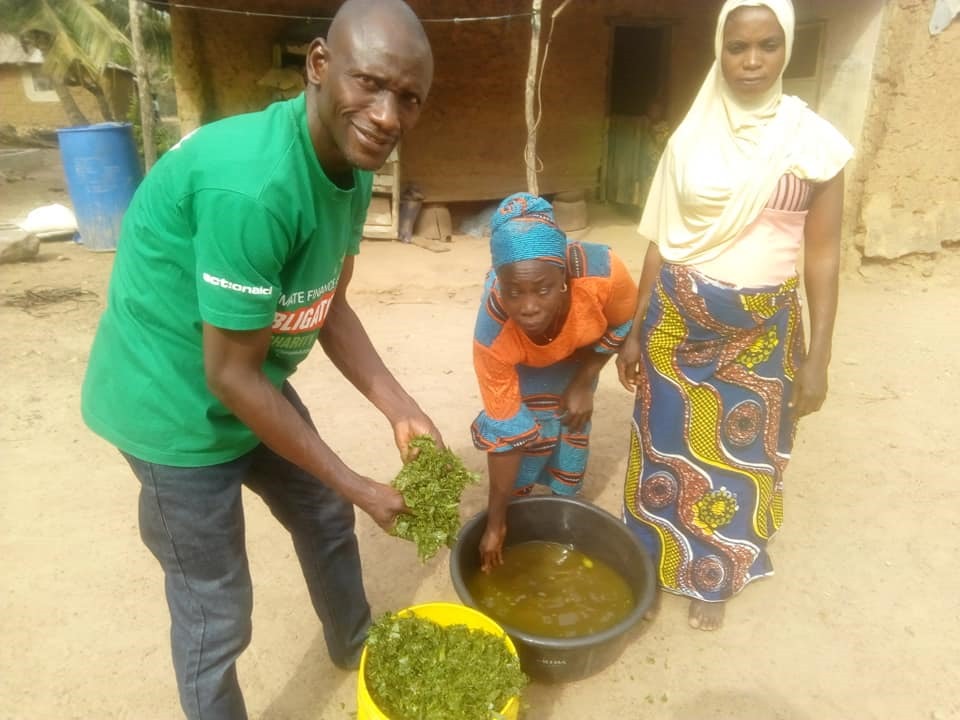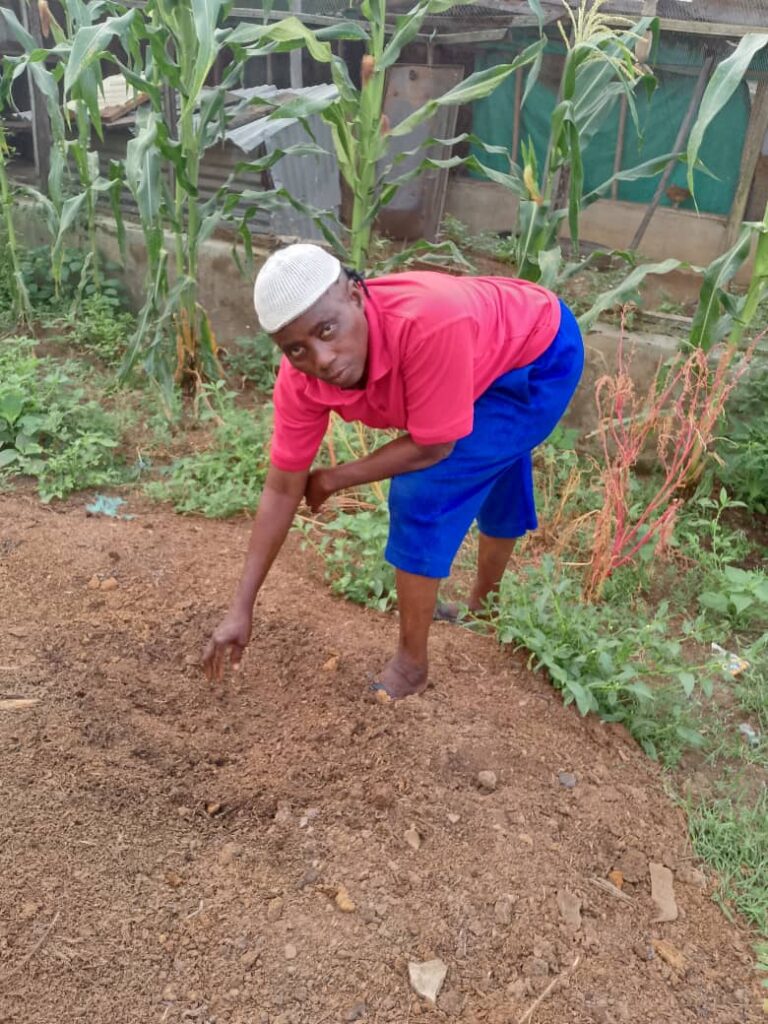By Bushrah Yusuf-Badmus, News Agency of Nigeria (NAN)
Mrs Elizabeth Ndako has been a smallholder farmer for many years. She grows grains and tubers in Patigi, Patigi Local Government Area of Kwara state. To boost her production, Ndako spends close to N300,000 on agro-chemical to increase productivity and keep farm produce from pests.
“Normally, I spend close to N300,000 on fertilizer and herbicides yearly if I do not want to waste my farm inputs.
“This is always a Herculean task for me yearly, because after buying these things, we have little or nothing to feed on before the things we planted grow,’’ she said.
At one point, however, this woman farmer could not afford the money as the price for the fertiliser kept increasing as a result of Nigeria’s economic situation.
Ndako started using chicken poop and spoilt foods as a means to an end when fertilisers were no longer affordable for her, but ironically, they ended up giving her more yields than expected.
‘’I have been using chicken poop and plant waste which I later learnt is called organic fertilizer for the past eight years, and I have never for once regretted it. It gives me more yield than when I was using chemical fertilizer.
‘’Another thing I noticed while using it is that the soil is not easily washed away when it rains compared to when I was using the chemical fertilizer,’’ she said.
This experience resonated with other smallholder women farmers, who are responsible for the bulk of food items in the market.
As the world grapples with the global economic and food crisis and the effects of the COVID-19 pandemic, Nigerians are not left out in finding means to, among all things, ensure food security and sustainability.
Women farmers play a key role in household food security and nutrition. Empowering female farmers can increase the availability of diverse and nutritious foods, improving family and community health.
Nigerian farmers face several constraints such as limited access to education, land, credit facilities and poor distribution networks. These results to low yields and high wastage rate during harvesting, processing and storage therefore reducing available food supply and rural women’s income.
With the hard means of survival and difficulty in feeding, more Nigerians women have gone into farming to feed themselves and family members, before they see it as a money making venture.
But surprisingly as many farmers are investing in planting and harvesting, based on the World Bank projections, about 40 per cent of Nigerians are estimated to still live below the international poverty line by the end of 2024.
Just like other developing countries, poverty in Nigeria is highly gendered. Although women make up about 50 per cent of Nigeria’s population, more than 60 per cent of them live in extreme poverty, majority of them are rural women.
Incidentally, the category of rural women is where the Small scale Women Farmers Organisation of Nigeria (SWOFON) members are. They farm basically to feed their immediate family and sell the remaining proceeds to earn a living. But with the high cost of fertilizer and herbicides, they suffer setbacks on their farms.
Their quest was to find an alternative to straining their lean purse to improve their yields, little did they know that they are working towards climate change mitigation.
Succour, however, came the way of some in Nigeria when in 2020, the Centre for Community Empowerment and Poverty Eradication (CCEPE) trained women farmers on the use of dung and plant wastes as organic fertiliser and pesticides
CCEPE trained 40 women farmers in Asa local government area, and 20 women farmers in Kaima local government of Kwara state, on how to make and use organic fertilisers and herbicides on their farms.
CCEPE Executive Director, Mr Abdurrahman Ayuba, said the training was organised in the face of ravaging impacts of climate change and the economic status of the women farmers.

CCEPE Executive Director, Mr Abdurrahman Ayuba and some women farmers at the training.
“We tend to look at alternatives to the high cost of farm inputs and how to support these women to source locally for their farming business without necessarily impacting negatively on their income and little money they have with them.
“By the time they use half of their income to procure fertiliser which is not readily available and also source expensive agro chemicals like pesticides, herbicides, they have little or nothing left to feed,’’ he said.
Mrs Ndako, who is also the SWOFON Coordinator in Kwara, said though the advantages of the organic fertilizer were enormous, they are slow in response compared to chemical fertiliser, but the wait was always worth it.
She appealed to the government to help in creating more awareness and education on organic fertiliser as it is more affordable for those in the rural areas.
One of the beneficiaries of the training, Mrs Sadiat Rasaki, from Omole, Asa local government, said the organic herbicides they were taught by using neem leaf helped her restore her farm that was almost consumed by insects and pests.

Mrs Sadiat Rasaki
“The training on herbicides was an answered prayer at that time because insects took over my farm and I couldn’t afford chemical herbicides, but when I used neem leaf the way we were taught, it was as if nothing happened to it before.
“Surprisingly, it didn’t affect the farm produce by the time they were harvested because that was my initial fear.
“That was what made me try to use the organic fertilizer as we were taught too, because I did not believe it could work.
“The year I first used organic fertilizer was the first year I had a bountiful harvest which are also good looking,’’ she said.
Another beneficiary, Alhaja Titi Ade-Salam, said prior to the training, she uses food remnants as fertiliser, and ashes as herbicides, but she doesn’t know the benefits accrued to it other than the fact that it saves her cost of purchasing fertilizer of almost N200,000 yearly.

Mrs Titi Ade-Salam
‘’We had the belief that chemical fertilizer is the best, but we were told that it makes the soil infertile, that organic improves the soil fertility.
‘’For herbicides, we were taught how to use neem leaves and black soap and for fertiliser, we were told to use chicken poop, goat poop and food remnants, but I have been using food remannts before the training.
“Using organic, my farm produce now have good yields and look attractive and greener than before. It is pocket friendly and easily accessible, compared to the chemical ones that the cheapest is N5,000.
“I urge farmers to make more enquiries on it to amass the benefits and also ensure that we are eating right from what we planted.”
The trainees, however, did not keep the knowledge to themselves, as a secondary beneficiary, Hajia Sherifat Ibrahim, from Ilorin South local government, said she learnt from one of the participants that biodegradable wastes can be used as manure.
Mrs Ibrahim said she gave it a trial when she couldn’t afford fertiliser (costing about N250,000) to boost the maize and vegetables she planted.
“Then, I bought five bags of chicken poo for N1500, and the maize and vegetables I planted them with, became the envy of my community members.
“Even my mentor in farming was surprised and he had to ditch the chemical fertilizer he bought for the organic ones as his maize has small seeds compared to my own. I had to give him out of my harvest that year.
‘’The maize looks like the premier seeds, very big like what we used to call Farmer’s seed then.
“We need more awareness because this will go a long way in reducing the financial strain on farmers and at the same time help the environment to be safe.
“The challenge we have regarding it now is that a bag of chicken poop is now N5000 per 100 kg and it is always heavy to carry for us as women,’’ she said.

Hajia Sherifat Ibrahim
Another secondary beneficiary, Mrs Funmilayo Lawal, who farms in Odoore, said she used chicken poop on a section of her farm where she planted vegetables to test the efficacy and was surprised at how well they turned out.
‘’I was not part of those that were trained, but our members told me that organic fertilizer makes farm produce really green and with big seeds.
‘’I have up to an hectare of farm, so I used it on a particular section and use chemical fertilizer on other parts to see the difference, I discovered that the organic works better than the chemical, though the result is slow compared to when the chemical one is used.
‘’I use it mostly to plant tomatoes, Okra and vegetables and the difference is very clear.
“My farm is in Odoore and I plant rice, maize, guinea corn, beans and vegetables. I sell most of my farm produce and consume just little out of all, but I often give out vegetables after taking what I want.”
Highlighting the importance of organic fertilisers and herbicides to the environment, Dr Sa’adat Yusuf of the Department of Crop Protection, University of Ilorin, who was the training facilitator, said the use of organic fertilisers and herbicides was long overdue, in the face of the effect of climate change on crops.
She said organic fertilisers and herbicides are boosters that are not based on chemicals, but naturally occuring which helps to address the issue of resistance to chemicals.
‘’When you use chemical fertiliser and herbicides for a long time, it will get to a point when the pests and the soil becomes resistant to the chemicals and it will no longer be effective.
“Also, it is environmentally friendly. When you use organic products, the environment becomes cleaner, the plants used to develop the crops are degradable and by the time they decompose, they improve the fertility of the soil.
‘’Then they are pocket friendly because neem leaves that we experimented with, can be gotten almost everywhere. So, at the end of the day, it improves the profit margin of the farmers,’’ she said.

Dr Sa’adat Yusuf
The university don said the farmers were trained on how to use neem leaves and seeds.
‘’The major ingredient we used during the training is Neem leaves. We trained them on how to use neem to produce fertilizer and to protect crops against pests.
“They were taken through how to use neem plant to protect their crops starting from the leaves, seeds and how to extract the oil in order to protect their stored produce.
“The residues were also incorporated into the soil to serve as fertiliser to improve the soil fertility,’’ Dr Yusuf said.
She, however, called on the government to key into it by producing these organic fertilizer and herbicides in large quantity, so that more people can key into its usage.
‘’The government can establish factories where they will produce these things in a large scale and pack them for the farmers to begin to buy just like they buy the chemical fertilizer.
‘’This will go a long way to promote the usage of organic fertiliser and pesticides,’’ she said. (NAN) (www.nannews.ng)
**If used, please credit the writer and the News Agency of Nigeria (NAN)
***This story is done with support from the Solutions Journalism Network (SJN) and the Nigeria Health Watch (NHW).











